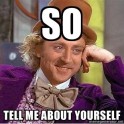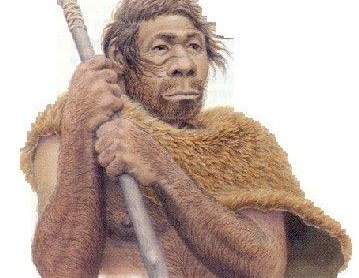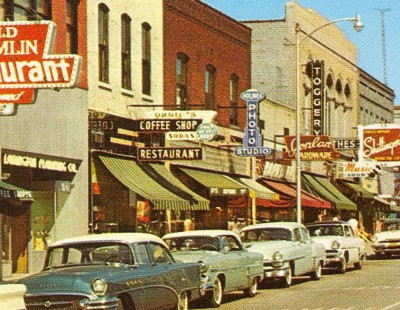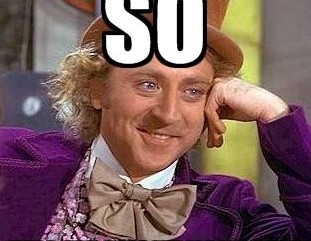-
Usernamemistilin8
-
Password
Leave password field empty to keep your existing password!
-
Confirm Password


Biographies are hard to write.
A 24 year old living in a relatively small town in Nebraska.

To be honest, we're kinda wimpy
Jun 03, 2020 3 years agoI know this is cliche to say, but humans in the 21st century are deeply alienated from nature. I left my apartment today to go for a walk, and right as I left it started raining. It wasn't a heavy rain, but the high wind exaggerated the rain's strength. I was maybe a hundred feet from the apartment when I considered turning back as I realized the rain was about to ramp up. Instead, I decided to push forward; a little rain can't hurt me. That moment's hesitation caused me to think: how many people living in this day and age would make the choice to turn back? If you could put every person on Earth in the scenario I was in, I'd wager at least half would decide not to continue the walk. Now, to be fair, it's just a walk. Why walk in the rain when you can just wait until the rain passes? It's just a walk; a little exercise isn't immediately important. But then again, it's just some rain. So many people would rush to shelter than braving a little cold and wet weather. Our ancestors would laugh at how wimpy we are. Think about what it was like for them. I'm writing this at about nine p.m. The wind outside is gusting hard. I'm here, laying down on a couch, in a insulated house, with lights that come on and off with the flick of a finger. My ancestors would be huddled in a tent or a cave. They'd have to endure the dark and cold all night. And the next night. And the night after that. For them, there are no walls. There are no carpets, or beds, or tables, or even chairs. We all know what it's like to sit and lay on the ground outside. Imagine that is pretty much, aside from maybe sitting on a log or a big stone, all you can ever do. These are obvious facts but they're nonetheless profound if you're able to imagine at least on some level what it's truly like to live so utterly dependent on nature. It's tough. Every aspect of your life is affected. I imagine most of your life is spent dealing with and worrying about the weather. Even the mere regular shift from day to night is a difficult, important occurrence. You know, now that I think about it, our ancestors probably wouldn't be so quick to laugh at our aversion to rain. I mean, they'd still think we are wimps. But they'd also understand that for them even minor rain is a fairly big deal. What if they're caught out hunting and they're hit with a sudden downpour? They can't run back to a house or car which is completely cut off from the rain and wind. If they're lucky they'd find a big tree to sit under. But a tree doesn't really shield you from the wind. And even a big tree doesn't always fully shield you from rain either. If their clothes got wet while trying to find shelter, they'd have to sit on the cold, wet ground in their cold, wet clothes, sometimes for hours until the rain passed. Rain is no joke for them. For all the modern struggles we have living in the era we do, at least we don't have these kinds of old struggles. Well, most of us don't. Keep in mind, homeless people still have to deal with, to some extent, these hardships. I wasn't really intending to write about homelessness when I started this, but it's something that inevitably came to mind.
Fuzzy History
Jun 01, 2020 3 years agoI was watching this video the other day on YouTube about a peculiar place where they treat senior citizens who are afflicted with Alzheimer's disease. This facility is designed to look like 1950's America: complete with 50's cars, diners, signs, technology, etc. There's a lot of interesting stuff in this video to talk about, for instance I find it intriguing that the most memory-provoking time for these elders apparently is the period where most of them were in their teens or twenties. There's also of course the tragic topic of the Alzheimer's disease itself. But I actually want to focus on one specific thing in the video that caught my attention: the newspapers. They had some replica (Or at least I assume they're replicas, they might actually be real, just preserved.) newspapers on display. The headline of one of the newspapers read: "Planes Drop 90,000 Men Behind Germans in France", a title obviously referring to World War Two, probably the mass airborne paratrooper invasion that took place around D-day. Considering the fact that this facility is supposed to be represent 1950's America, having this newspaper displayed here is technically inaccurate. The end of WW2 was in '45. Not that it really matters in this case; the care facility is more so meant to represent that general time period rather than to have complete historical accuracy. Besides, with all due respect to the elders suffering from Alzheimer's, they probably won't notice such a relatively small detail anyway. However, it may not just be the elders who skip over this detail. I wonder how many of my generation or younger would have looked at this headline and thought that WW2 took place during the 50's. Maybe I'm being a bit pessimistic and frankly rude to the intelligence of my own generation when I think this way. I hope I'm mistaken and that only a tiny fraction actually believes the war took place during the 50's. But I'm not so sure. There's an obvious statement I could try to make here about the quality of our educational system, but I'd rather look at this thought in a different way. Instead of deriding the newer generations for not knowing their history, perhaps we should see it as a natural consequence of time moving forward. What I mean by that is, the further along in time we get, the fuzzier people's perception of historical events becomes. This is not just true with one's ability to remember their own past life events, but also with general world history. The reason for this I think has a lot to do with people's personal connection to past events. People care less about an event the less they're personally connected to it. For instance, many people know the exact year that President Obama was elected and the year he left office. They know because they experienced it themselves firsthand. In contrast, the number of people who know the exact years emperor Caesar reigned over Rome is minuscule. We can discuss and compare the historical significance of each ruler but I think they're both at least somewhat similar in importance to each other. Yet one is far more familiar within the minds of today's public than the other. That's because no one alive today has any strong personal connection to Julius Caesar. No one knows any immediate family members that have lived during Caesar's time, nor does anyone feel like their lives have been personally impacted by Caesar's policies and politics. So they care less to know about him. As time goes by, events which are unmistakable to the people living through them become vague to newer generations. This happened to the citizens of Rome, it's happening to our elderly, and one day it will happen to us as well. 1950 was 70 years ago. Imagine teenagers in the year 2090 being asked something like: "What year was the first Iphone released: 2007 or 2017?" Probably a fair percentage of them would get the answer wrong! But can you really blame them? I'm not advocating we should forget our history because it's natural to forget. On the contrary. This is a call to recognize that with the passing of each new day, we are losing more and more our personal connection to the past. Age and Alzheimer's may be fuzzying the memories of our elders, but it doesn't have to be so for us youth.
Biographies are hard to write
May 26, 2020 3 years agoThis'll be my first ever post on my first ever account here so what better a time to talk about writing a mini-description of myself. I mean, describing myself isn't a difficult task at all. If you want me to tell you about my personal history or my likes or hobbies, that's a cake walk. But when I do that, am I really saying anything? I suppose these sorts of mini-biographies are meant to just give the reader a general sense of the person they're describing, but man, they are sure vague. For instance, during my childhood for a period of about seven years I lived in Europe - first in England and then the Netherlands, where I learned to speak Dutch fluently. Additionally I've travelled to at least nine other countries and I've been to probably over thirty of the U.S. states. Just going off of that information alone you might get the impression I'm adventurous, or perhaps you'd assume I'm very outgoing with a rich social life with friends I keep in contact with from all over the world. To which I'd say: not really. Or what if I mention that I play the piano, and I'm an NBA fan, and I graduated salutatorian of my high school class, and I like alternative rock and new-metal music, and my father is a Vietnam vet and a retired professional pilot, and I'm half Filipino. Yes, it's all true, but you may draw wildly different assumptions about me just based on these broad statements. Sure, I play the piano. I've been playing for roughly ten years. Am I good at it? Nope. Can I read sheet music? Yeah, but not very well. Do I know musical theory? Hardly. Did I have a piano teacher? I did. An extremely talented woman who lived on a farm taught me for a few years back in sixth and seventh grade. Yeah, I'm a basketball fan, but only in the last year or two have I actually seriously started following the NBA. I could keep going but I think you get the point. I guess the lesson here is to continuously write. If you want your readers to have a truer sense of who you really are, the only way to convey yourself is to communicate it. One thing I've realized is that the more you write about yourself, the more you realize how little of your life you've actually written. Here's a quote that I think is uniquely created by me but has probably been made by someone sometime before: a lifetime of experience requires a lifetime of writing to tell it.











_2_media.jpg)
